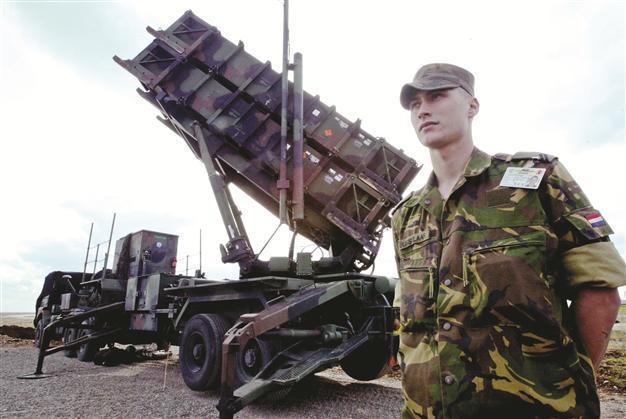Raytheon sweetens offer with new system
ANKARA - Hürriyet Daily News

A soldier stands by a Patriot anti-missile battery at a military airport in 2003. Raytheon says it will send its latest systems if chosen for Turkey’s missile deal. REUTERS photo
Raytheon has sweetened its offer for the Turkish long-range air and missile defense (T-loramids) bid by announcing that it would send its latest new-production Patriot systems if selected, considerably improving its chances.
Mike Boots, program manager of the Turkey Patriot Program for Raytheon Integrated Defense Systems, told the Hürriyet Daily News, “Raytheon has offered the latest new-production Patriot system to Turkey.”
Raytheon is joining the Turkish bid together with Lockheed Martin, another U.S. company and the world’s largest defense firm.
US Army approvalThe Raytheon Company’s new-production Patriot Air and Missile Defense System recently received the U.S. Army’s final stamp of approval after undergoing stringent testing. During the testing, the system performed well when subjected to challenging climatic and electromagnetic environments, the company said in a statement.
“This approval validates the modernized Patriot system’s readiness to counter evolving threats and protect war fighters and allies in a combat situation,” said Sanjay Kapoor, vice president for Integrated Air and Missile Defense at Raytheon’s Integrated Defense Systems business, according to a Nov. 12 statement.
Patriot batteries in Germany and the Netherlands have been brought to Turkey at least once since the Gulf War of 1991. While Turkish analysts claim they are outdated systems, a Daily News survey determined that they have been consistently upgraded, meaning a Dutch or German Patriot battery has nearly the same capability as the latest systems.
The batteries can fire both Lockheed Martin’s Pac-3 missiles, effective against incoming weapons with chemical and biologic capabilities, and Raytheon’s GEM-T systems, when the approaching aggressive missiles lack these capabilities.
Officially, Turkey has a separate T-loramids program, which is also approaching a decision. The competitors for this program include U.S. partners Raytheon and Lockheed Martin with their Patriot-based system; Eurosam with its SAMP/T Aster 30; Russia’s Rosoboronexport, marketing the country’s S300 and S400 systems; and China’s CPMIEC (China Precision Machinery Import and Export Corporation), offering its HQ-9.
“The Turkish authorities definitely would want the leased Patriot systems to remain in Turkey, rather than to pay the whole figure of the systems, worth up to $4 billion. If things go well, it would have the systems this way. If not, it would either blame NATO or buy the systems,” one defense analyst in Turkey said. Officials from the country’s office for procurement, the Undersecretariat for Defense Industries (SSM), have said the selection process is completely independent of the potential move to request the leasing of Patriot systems from NATO in response to the Syrian crisis.
